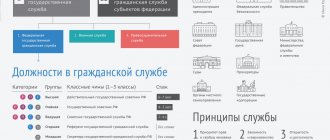Payments to military personnel and their families
The main incentive for service is monetary compensation consisting of: monthly salary under the contract (No. 306-FZ) and monthly salary for the position held (Articles 12, 13 No. 76-FZ). In addition to cash benefits, a serviceman can receive additional funds equivalent to bonus payments.
The family of a soldier serving under conscription or contract has the additional right to:
- Receiving a lump sum benefit upon the birth of a child
- Receiving an additional monthly child benefit until the child turns 3 years old
- Outside the regular distribution of children to preschool and school institutions
- Compensation for kindergarten fees is 80-90%
- Free travel for family members of a military personnel to a place of vacation and back to any point in the country once a year (does not apply to vacations abroad)
- To compensate for part of the expenses when paying for rented housing, the amount of compensation depends on the region of residence.
Payments for military personnel in 2021
1. Such issues are resolved only by military medical examination and ITU. This is not exactly a legal category, since it touches on medical and socio-medical issues. This means that it is an object of expert (medical, forensic, socio-medical) research. 2. Currently, there is a Decree of the Government of the Russian Federation dated July 4, 2013 N 565 (as amended on March 16, 2019) “On approval of the Regulations on military medical examination.” And there's Title IX. Determination of the causal relationship of injuries, diseases of military personnel, citizens called up for military training, employees, citizens who served in military service and equivalent service, military training, and prosecutors. But this document applies to newly emerged legal relations. For those legal relations that arose before its appearance, other legal acts are applicable. It all depends on the exact date of the concussion and the disease it provoked. And also the confirmed presence of a cause-and-effect relationship between these two facts. 3. There is also a regulatory legal act, Decree of the Government of the Russian Federation of February 20, 2006 N 95 (as amended on March 22, 2019) “On the procedure and conditions for recognizing a person as disabled.” Section II. Conditions for recognizing a citizen as disabled. Part 14: if a citizen is recognized as disabled, the following causes of disability are established: clause f) military injury; g) the disease was acquired during military service; p. p) disease (wound, concussion, injury) received by a person serving active military units of the Armed Forces of the USSR and the Armed Forces of the Russian Federation, located on the territories of other states during the period of hostilities in these states. In the absence of documents confirming the fact of an occupational disease, work injury, military injury or other circumstances provided for by the legislation of the Russian Federation that are the cause of disability, a general disease is indicated as the cause of disability. In this case, the citizen is provided with assistance in obtaining these documents. When the relevant documents are submitted to the bureau, the cause of disability changes from the date of submission of these documents without additional examination of the disabled person. The procedure for establishing the causes of disability is approved by the Ministry of Labor and Social Protection of the Russian Federation.
4. There is also an Explanation of the Ministry of Labor of the Russian Federation dated April 15, 2003 N 1 “On the determination by federal state institutions of medical and social examination of the causes of disability” (approved by Resolution of the Ministry of Labor of the Russian Federation dated April 15, 2003 N 17), according to which Determination of the causes of disability in in accordance with Article 8 of the Federal Law of November 24, 1995 N 181-FZ “On the social protection of disabled people in the Russian Federation” is entrusted to federal state institutions of medical and social examination. There is also clause 7, which reads: 7. The cause of disability with the wording “military injury” is determined for citizens discharged from military service (hereinafter referred to as former military personnel), in cases where the disability of former military personnel was due to injury (wounds, trauma, concussion) or illnesses received while defending the Motherland, including in connection with being at the front, performing military service in the territories of other states where hostilities took place, or while performing other military service duties (Federal Law of December 15, 2001 N 166- Federal Law “On State Pension Provision in the Russian Federation”) (Collected Legislation of the Russian Federation, 2001, No. 51, Art. 4831; 2002, No. 30, Art. 3033). In the same paragraph there are other clarifications on this issue.
5. In connection with the above, you need advice from a specialist competent in this matter in the field of expert (forensic, socio-medical) research. We provide answers only to general legal questions.
Answer
Right to education and health care
Military personnel serving under contract have the right to receive free medical care at their place of stay. Medical care refers not only to the treatment of diseases, but also to performing various types of operations. In this case, treatment must take place on the territory of the Russian Federation.
If the total service time of a serviceman exceeds 3 years, the serviceman receives the right to free education in civilian higher and secondary specialized educational institutions via correspondence or part-time (evening) form. This rule does not apply to cadets of military universities.
Payment amount
The unit for calculation is the official salary with the required allowances.
A high degree of skill will increase the size by 30 percent. Service in difficult conditions brings the supplement to 100 percent of the salary. Importance is attached to remoteness and unfavorable environmental conditions (high mountains, desert, problematic water supply).
One spouse will receive the full official salary. The other, together with his relatives, is twenty-five percent of his share. Travel allowances are paid in full, the amount increases to 120 rubles per person per day.
Maternity benefit (M&B)
Right of way
Contract servicemen can count on the following benefits:
Free pass:
to the place of duty
to a new place of residence
on business trips
travel for treatment
When transferred to a new duty station, it is possible to transport things in a container with a capacity of up to 20 tons
If the service takes place in the Far North, family members can count on travel to the place of rest and back at the expense of the state
If personal transport is used for official purposes, the serviceman has the right to receive compensation for gasoline and other expenses. The basis for compensation is a document confirming the use of personal transport for business purposes.
Tax benefits Since 2021, military personnel are exempt from paying land and property taxes.
Conditions for receiving lifting payments

It is worth mentioning monetary compensation, which is not limited to one official salary.
Military personnel are entitled to one-time and permanent bonuses for:
- length of service;
- degree of qualification;
- working conditions;
- performing complex tasks.
They increase from 5 to 65 percent up to a month's salary.
A sergeant and an ordinary contract soldier are paid from 25 to 32 thousand rubles, taking into account the increasing coefficients in force in the regions. When moving, a number of certain conditions must be met, otherwise it will be impossible to obtain lifting allowances.
The list of contract soldiers is listed in Article 13 No. 76. When both spouses undergo military service, a choice is made in favor of one. The highest salary will be taken into account.
Incentive payments
All that remains is to collect supporting documentation and submit a report on the allowance for military personnel, listing the legal grounds.
Providing military personnel and members of their families with living quarters.
| In accordance with Part 1 of Article 15 of the Federal Law of May 27, 1998 No. 76-FZ “On the status of military personnel,” the state is the guarantor of providing military personnel with living quarters by providing funds for the purchase or for its construction or provision of living quarters at the expense of the federal budget. |
Residential premises can be provided to contract military personnel who are citizens of the Russian Federation and members of their families for their permanent residence, depending on the desire of the serviceman, or under a social tenancy agreement (in this case, the owner of the apartment is the state, and military personnel and members of his family have an indefinite the right to reside in this residential premises, without the right to dispose of it), or directly into the property (in this case, the serviceman and his family members are in equal shares the owners of the residential premises with the right to dispose of them at their own discretion). This right does not apply to conscripted military personnel.
Housing for military personnel upon discharge
If a person has served for 10 years or more, is dismissed from service, due to reaching the age limit for service, for health reasons or in connection with organizational and staffing measures, in the last year of military service of the Ministry of Defense of the Russian Federation, if the serviceman wishes, a state housing permit is issued certificate for purchasing housing for a family.
If a serviceman was a participant in the savings-mortgage system, then in certain cases, upon dismissal, he can use savings for the purchase of housing or construction, which are accounted for in his personal savings account.
What does a military personnel's income consist of?
The main type of income for contract employees is wages. The second article of Federal Law No. 306 indicates that allowance is divided into two parts: salary and additional payments.
The salary is paid in accordance with the position held and the title received. The correlation of military salaries is spelled out in detail in Government Resolution No. 992 “On the establishment of salaries for military personnel serving under contract.”
Additional payments to the Russian military are provided in accordance with the tenth paragraph of Art. 2 Federal Law No. 306. The amount of these payments depends on the classification of the service, the danger of the tasks performed, and access to classified state information. Additional payments are calculated as a percentage of the salary.
The bonus depends on the military’s length of service. It can range from 10 to 40% of the salary.
Reasons for removal from service
The rules for terminating labor relations regulated by labor legislation for the civilian population do not apply to military personnel.
According to Law No. 53-FZ, as amended as of 04/06/2015, regulating the process of military service, a serviceman can resign in the following cases:
- at the end of the contract or conscription period; according to the age limit, varying for men depending on rank in the range from 45 to 65 years, for women - 45 years; at your own request; for family reasons, including moving to another area, the need to supervise and care for relatives of the 1st and 2nd degree of kinship; for health reasons, due to illness or injury that makes it impossible to continue serving and perform official duties; for organizational events; in the event of obstacles caused by force majeure circumstances that do not depend on the will of the citizen.
Upon dismissal from military service for the above reasons, in accordance with Law No. 306-FZ as amended on April 6, 2015, monetary compensation is due. However, payments to military personnel may be canceled if the following factors contributed to the termination of the contract:
- deprivation of military rank; unworthy completion of the probationary period; disciplinary violation; evasion of assigned duties; committing a crime and being punished; transfer to other law enforcement agencies.
Based on individual personal circumstances, a serviceman may submit a report, which is mandatory for consideration and a verdict by a special commission.









